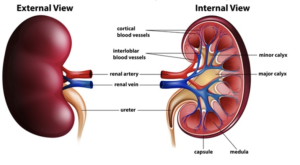CONDITIONS
What is Kidney?
The kidneys, bean-shaped organs situated deep within the body, play an integral role in maintaining overall health and well-being. The kidneys filter minerals from the blood, maintain overall fluid balance, excrete waste products, regulate blood pressure, and produce essential hormones. In good health, the kidneys efficiently filter approximately half a cup of blood per minute, extracting waste products and excess water to produce urine.

Anatomy of Kidneys
The kidneys, each about the size of a fist, are bean-shaped organs on either side of the spine, just below the rib cage. Each kidney is approximately 11 to 14 cm in length, 6 cm in width, and is about 4 cm thick. The average weight of the kidney is from 125 to 175 gm in men and 115 to 155 gm in women. The main parts of the kidney include
- Renal Cortex and Medulla: The outer region of the kidney is called the renal cortex, while the inner region is known as the renal medulla. These regions contain millions of tiny functional units called nephrons responsible for filtering and processing waste materials.
- Renal Pelvis: It is a funnel-shaped structure that collects the filtered waste material and urine and directs it to the ureter for elimination.
- Renal Arteries and Veins: The kidneys receive a rich blood supply through renal arteries, which allows for effective filtration and exchange of waste products and essential substances.
Function of Kidneys
- Filtration and Removal of Waste: The kidneys act as remarkable filters, removing waste products, excess water, and toxins from the blood. Each nephron within the kidneys is like a mini-filtering factory, selectively allowing important substances like nutrients and electrolytes to be reabsorbed back into the bloodstream while eliminating waste products.
- Regulation of Fluid and Electrolyte Balance: The kidneys help regulate the balance of water, electrolytes (sodium, potassium, and calcium), and acid-base balance in the levels in the body.
- Production of Hormones: The kidneys play a crucial role in hormone production, including erythropoietin, which stimulates the generation of red blood cells, and renin, which aids in regulating blood pressure. These hormones are vital for sustaining healthy blood composition and overall bodily function.
- Production of Active Form of Vitamin D: The kidneys are essential in converting vitamin D into its active form, which is necessary for the body. In chronic kidney disease, vitamin D levels can be significantly reduced, sometimes reaching critically low levels.









